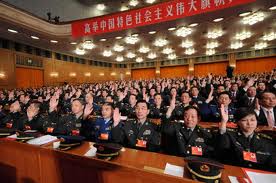In my earlier post – of close to the same name – I mentioned that it was Minghao Zhao’s earlier NYT op-ed, dated July 12th, “The Predicaments of Chinese Power,” that got me thinking again about the US-China relationship.
Now as I pointed out in this earlier blog post, Zhao is currently a research fellow at the China Center for Contemporary World Studies, the think tank for the International Department of the Central Committee of the CPC. I learned subsequently from my colleagues in China that he graduated from Peking University (Beida) with an MA and is also the Executive Editor of the China International Strategy Review a publication from the School of International Studies (SIS) at Beida.
Okay what did Minghao Zhao have to say? Well like any good international relations specialist, Zhao focuses a lot on power and the various forms it takes in the global governance system. Summarizing Zhao, he suggests the following:
- It remains a controversial issue as to what China’s grand strategy is, or should be;
- When we measure China’s power we find that it is powerful on some measures – population, global trade, gross domestic product but is woefully inadequate on per capita GDP and near the bottom on the human development index;
- Looking at the employment of power and influence, China has a long way to go, say in comparison to the US, whether it is hard power or especially “soft power”;
- China is, as described by Zhao, “
… still unfamiliar with these new power games. The complex web of national security threats facing China underscores the need for greater efforts to integrate the strategic tools of diplomacy, defense and development. What is more, China has not yet found a way to utilize “civil power” in achieving sustainable diplomatic successes.
- China still has a way to go to find a strategy that will reassure other countries – read that as its near neighbors – especially in the South China Sea and also the greater powers – Japan, Korea and especially the United States. China has also not learned – here I am not sure China is the only great power that suffers from this, read that as the United States – to practice multilateralism where the powers share responsibility in deciding and acting. Indeed Zhao summarizes well this gap between between its power and its intentions:
While the Chinese truly believe in their declared peaceful intentions, they have yet to convince others especially the United States and Asian neighbors. China needs to boost its participation in multilateral forums and readjust its approach to stress the sincerity of its commitment to peaceful development.
- Finally – and here I suspect Zhao draws his conclusion from having observed the United States over the past few decades – China needs to restrain itself. If I can summarize here the world needs to take a “deep breath” and avoid adopting a pose of exaggerated fear given China’s rise and the growing power China has, and is acquiring. At the same time China’s leaders need to restrain themselves when it comes to the territorial disputes that now plague China on its maritime borders and to constrain the nationalist impulses that pulse through the China blogosphere and presumably more broadly in Chinese society.
As our colleague describes it:
An exaggerated fear of China’s capacities and intentions can itself become a couse of conflict and lead to tragic results. China’s entry into the world must be accompanied by a new dynamic of mutual accommodation with that world.
For a number of years many China observers asserted that Chinese policy followed Deng Xiaoping’s historical dictum: 韬光养晦 – taoguang yanghui – concealing one’s capabilities; biding one’s time to have an achievement. Though the phrase is not free of controversy over its meaning, most agree that at least in terms of strategic policy that China shouldn’t be overtly aggressive and take a forward and assertive policy stance.
Now there has been a Washington view since about 2010 that China’s restrained policy stance – or what I would suggest as a junior partner role – has come to end. Because China is a global power – this is a phrase that Minghao Zhao adopts and is expressed by many experts though I think it is a highly problematic description of China currently – and there is a strong current of opinion in China that the United States is in decline, and in fact that China has been too defensive – that China could, and should, now be more assertive. Indeed because of this perceived new Chinese assertiveness, at least in the region, that US policymakers have articulated this Pacific or Asia pivot, as described in the earlier post.
So it seems we are now witnessing an emerging gyre of “action and push back” by the United States and China. Is this the best way in fact to characterize the US-China interaction. Well I don’t think we have reached this point but it is difficult to both assess China strategic policy – indeed almost everyone agrees that is near impossible to describe China’s grand strategy – and therefore to determine if the US-China is in some growing tit-for-tat strategic framework. Certainly leaders from both countries assure each other – and the global public – that the relationship is not of that sort and that their strategic policy continues to count on maintaining a positive engagement and collaborative policy.
So let’s examine more closely the relationship in the next few days.
Image Credit: news.xinhuanet.com – The Central Committee of CPC


